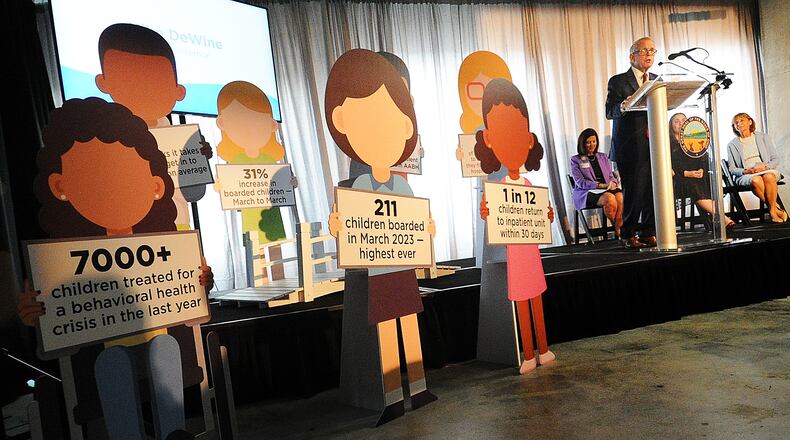These mobile response services are for youth under 21 who are experiencing significant behavioral or emotional distress, OhioMHAS said.
“In that urgent moment when a young person is in a mental health crisis, families need to know immediately where to turn for help,” said Governor Mike DeWine.
Credit: Jennifer McCray
Credit: Jennifer McCray
With these mobile response services, a team of trained professionals will go directly to the person experiencing distress and de-escalate the situation, DeWine said.
“It’s as necessary as first responders in a physical emergency. So, we are eager to make this model available statewide,” DeWine said.
Services like these are critical, said Kara Wente, director of the Ohio Department of Children and Youth.
“As a parent or caregiver, our first priority is making sure our children are OK,” Wente said.
Diverting youth from ER visits
Studies have reported an increase in emergency department behavioral health visits nationally, said Dr. Kelly Blankenship, associate chief medical officer of behavioral health at Dayton Children’s Hospital.
Others states have been able to divert pediatric emergency department behavioral health visits with the use of mobile response stablization services, said Blankenship, who believes an expansion of those services in Ohio would be beneficial.
“If we can help divert youth from adult emergency departments and allow them to be evaluated in their home or school, this improves access and allows youth to be evaluated by clinicians that specialize in youth mental health crisis evaluations,” Blankenship said.
This can also improve the timeliness of the evaluation, she said.
“When the family calls the crisis line, they speak with a staff member who can help the family in the minute while dispatching a clinician to come to the family to assess the child,” Blankenship said.
Making services available for all Ohio youth
DeWine, in his 2024 State of the State address, said these services should be made available statewide. These services are currently only available in 47 Ohio counties.
“This marks one step forward toward ensuring all Ohioans have someone to talk to, someone to respond and somewhere to go when they are experiencing a behavioral health crisis,” said OhioMHAS director LeeAnne Cornyn.
Locally, services are only available in Butler and Warren counties, according to the state’s list of providers. Butler Behavioral Health covers both of those counties as part of the state’s mobile response stablilzation services program.
“Because so many counties had difficulties rolling out the services, this renewed commitment, engagement from the state is going to make a huge difference,” said Helen Jones-Kelley, executive director of the Montgomery County Alcohol, Drug Addiction, and Mental Health Services board.
Medicaid billing is ready
The difficulty of offering mobile crisis response services is the cost, Jones-Kelley said.
Billing for crisis services for youth will be easier than it was for adults, as the Ohio Department of Medicaid has billing codes set up for crisis services for youth, while it currently does not offer that for adults, Jones-Kelley said.
“The need is so, so critical and certainly critical with young people,” Jones-Kelley said.
The state is bringing young people’s crises services online to that need, Jones-Kelley said. She is hopeful that will also help the adult system.
Credit: Greg Lynch
Credit: Greg Lynch
“When a young person is having a behavioral health crisis, it is vital that they get the help they need as soon as possible,” said Maureen Corcoran, director of Ohio Medicaid. “It’s important that the young person, their family, teachers and communities all across Ohio have access to this kind of support, a service that provides immediate help when every moment counts.”
OhioMHAS anticipates the new regional model to be implemented by January 2025.
The full request for proposals, due Aug. 30, can be viewed on ohiobuys.ohio.gov.
Individuals in need of services can call the mobile response stabilization services statewide call center 24 hours a day, seven days a week at 1-888-418-6777 (1-888-418-MRSS).
People experiencing a mental health crisis can also call 988, the national suicide prevention hotline.
About the Author


